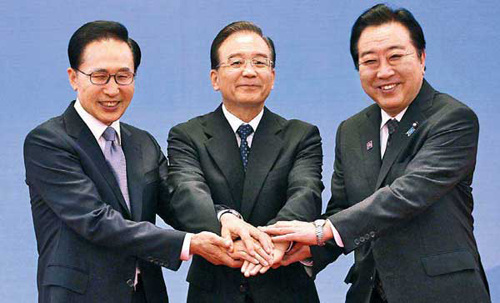
Premier Wen Jiabao, ROK President Lee Myung-bak and Japanese Prime Minister Yoshihiko Noda attend the fifth trilateral meeting in Beijing on Sunday. The three nations reached an agreement that they will not accept further nuclear tests or any provocations from the Democratic People's Republic of Korea. Wu Zhiyi / China Daily
China, Japan and ROK on course for landmark regional trade pact
A "milestone" investment agreement between China, Japan and the Republic of Korea was signed in Beijing on Sunday, after years of negotiations, while the leaders of the three nations announced that talks focusing on a free-trade agreement would be launched within the year.
Aside from substantial economic benefits, experts said that the FTA, if realized, could help ease regional tension and possibly lead to a more integrated Northeast Asia.
Washington, which is pushing forward its Trans-Pacific Partnership, should not feel concerned about the potential three-way FTA as any future agreement will also be in the interests of the US, experts said.
Trade ministers from the three countries signed a promotion, facilitation and protection of investment agreement on Sunday as their leaders — Premier Wen Jiabao, ROK President Lee Myung-bak and Japanese Prime Minister Yoshihiko Noda — met in Beijing ahead of a summit scheduled for Sunday and Monday.
"The investment agreement is the first legal document on trilateral cooperation in the economic field, it is a milestone," Wen said at a joint news conference at the Great Hall of the People.
China welcomes Japan and the ROK expanding their investments in China and hopes they will be primary destinations for China's overseas investments, he said.
"The global economy is recovering slowly while the European debt crisis is not over," Wen said.
"The establishment of a free-trade pact will unleash the economic vitality of the region and give a massive boost to economic integration in East Asia," he said.
The investment agreement, concluded in March after 13 rounds of negotiations since 2007, includes 27 clauses and one additional protocol covering topics such as investment definition and dispute resolution, according to a statement on the website of the Ministry of Commerce.
The pact will provide a more stable and transparent investment environment for the three parties and is an important basis for the FTA, according to the ministry's statement.
"The investment agreement and the establishment of the FTA will see China further open up its market, upgrade industries and be a new driving force for China's economic growth,'' Zhang Xiaoji, a researcher at the State Council's Development Research Center, said.
The establishment of a three-way FTA could enhance China's GDP growth by 0.5 percent and domestic employment by 0.1 percent while accelerating exports by more than 4 percent, Zhang said.
"The past three decades have seen Japan and the ROK increase investment in China but the next three decades will see China increase investment in these two countries. The investment agreement will play a very positive role in deepening investment cooperation," Zhang Yansheng, secretary-general of the academic committee of the National Development and Reform Commission, said.
Japan and the ROK are leading investors in China.
Japan invested about $80 billion while the ROK invested about $50 billion up to the end of last year, according to a report released by the Foreign Ministry on May 9.
"The build-up to the FTA will see more and more goods enjoy zero-tariff treatment and more services traded. It will help China bring in advanced technology and talent from these two partners," Zhang Yansheng said.
Trade between the three countries surged to more than $690 billion in 2011 from $130 billion in 1999.
China has been the largest trading partner of Japan and the ROK for several years while Japan and the ROK are China's fourth and sixth-largest trading partners respectively.
While Tokyo and Seoul are concerned about their agriculture sectors, China will see challenges to its manufacturing, said Wang Luo, a researcher from the Chinese Academy of International Trade and Economic Cooperation, a Ministry of Commerce think tank.
Qu Xing, director of the China Institute of International Studies, said the FTA could help ease regional tension and may finally lead to an integrated Northeast Asia.
The FTA could even lead to a joint currency, he added.
"It might be a breakthrough in solving regional disputes."
The FTA, with greater cooperation between the three countries, will ultimately benefit the US, Qu said.
However, Derek Scissors, economist at the Heritage Foundation, said China will sign a trade agreement fairly soon with the ROK but it will be more difficult for Japan.
"It will be hard for Japan to join the Trans-Pacific Partnership because it will require major economic changes. It will also be hard for Japan to sign a free-trade agreement with China for political reasons, because it would seem that Japan was choosing China over the US," he said.

Copyright ©1999-2011 Chinanews.com. All rights reserved.
Reproduction in whole or in part without permission is prohibited.